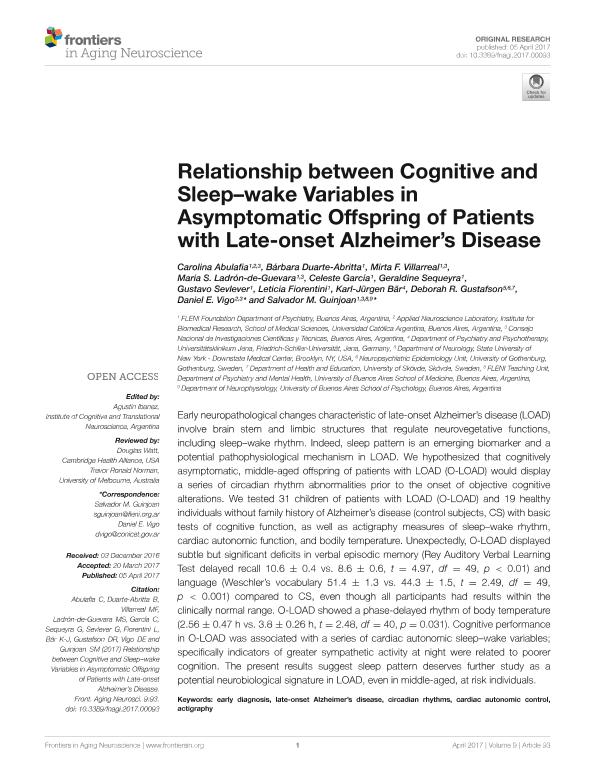Artículo
Relationship between cognitive and sleep–wake variables in asymptomatic offspring of patients with late-onset Alzheimer’s disease
Abulafia, Carolina Andrea ; Duarte Abritta, Bárbara; Villarreal, Mirta Fabiana
; Duarte Abritta, Bárbara; Villarreal, Mirta Fabiana ; Ladrón de Guevara, Maria Soledad
; Ladrón de Guevara, Maria Soledad ; Garcia, Maria Celeste; Sequeyra, Geraldine; Sevlever, Gustavo; Fiorentini, Leticia
; Garcia, Maria Celeste; Sequeyra, Geraldine; Sevlever, Gustavo; Fiorentini, Leticia ; Bär, Karl-Jürgen; Gustafson, Deborah; Vigo, Daniel Eduardo
; Bär, Karl-Jürgen; Gustafson, Deborah; Vigo, Daniel Eduardo ; Guinjoan, Salvador Martín
; Guinjoan, Salvador Martín
 ; Duarte Abritta, Bárbara; Villarreal, Mirta Fabiana
; Duarte Abritta, Bárbara; Villarreal, Mirta Fabiana ; Ladrón de Guevara, Maria Soledad
; Ladrón de Guevara, Maria Soledad ; Garcia, Maria Celeste; Sequeyra, Geraldine; Sevlever, Gustavo; Fiorentini, Leticia
; Garcia, Maria Celeste; Sequeyra, Geraldine; Sevlever, Gustavo; Fiorentini, Leticia ; Bär, Karl-Jürgen; Gustafson, Deborah; Vigo, Daniel Eduardo
; Bär, Karl-Jürgen; Gustafson, Deborah; Vigo, Daniel Eduardo ; Guinjoan, Salvador Martín
; Guinjoan, Salvador Martín
Fecha de publicación:
04/2017
Editorial:
Frontiers Research Foundation
Revista:
Frontiers in Aging Neuroscience
ISSN:
1663-4365
Idioma:
Inglés
Tipo de recurso:
Artículo publicado
Clasificación temática:
Resumen
Early neuropathological changes characteristic of late-onset Alzheimer's disease (LOAD) involve brain stem and limbic structures that regulate neurovegetative functions, including sleep-wake rhythm. Indeed, sleep pattern is an emerging biomarker and a potential pathophysiological mechanism in LOAD. We hypothesized that cognitively asymptomatic, middle-aged offspring of patients with LOAD (O-LOAD) would display a series of circadian rhythm abnormalities prior to the onset of objective cognitive alterations. We tested 31 children of patients with LOAD (O-LOAD) and 19 healthy individuals without family history of Alzheimer's disease (control subjects, CS) with basic tests of cognitive function, as well as actigraphy measures of sleep-wake rhythm, cardiac autonomic function, and bodily temperature. Unexpectedly, O-LOAD displayed subtle but significant deficits in verbal episodic memory (Rey Auditory Verbal Learning Test delayed recall 10.6 ± 0.4 vs. 8.6 ± 0.6, t = 4.97, df = 49, p < 0.01) and language (Weschler's vocabulary 51.4 ± 1.3 vs. 44.3 ± 1.5, t = 2.49, df = 49, p < 0.001) compared to CS, even though all participants had results within the clinically normal range. O-LOAD showed a phase-delayed rhythm of body temperature (2.56 ± 0.47 h vs. 3.8 ± 0.26 h, t = 2.48, df = 40, p = 0.031). Cognitive performance in O-LOAD was associated with a series of cardiac autonomic sleep-wake variables; specifically indicators of greater sympathetic activity at night were related to poorer cognition. The present results suggest sleep pattern deserves further study as a potential neurobiological signature in LOAD, even in middle-aged, at risk individuals.
Archivos asociados
Licencia
Identificadores
Colecciones
Articulos(BIOMED)
Articulos de INSTITUTO DE INVESTIGACIONES BIOMEDICAS
Articulos de INSTITUTO DE INVESTIGACIONES BIOMEDICAS
Articulos(OCA HOUSSAY)
Articulos de OFICINA DE COORDINACION ADMINISTRATIVA HOUSSAY
Articulos de OFICINA DE COORDINACION ADMINISTRATIVA HOUSSAY
Citación
Abulafia, Carolina Andrea; Duarte Abritta, Bárbara; Villarreal, Mirta Fabiana; Ladrón de Guevara, Maria Soledad; Garcia, Maria Celeste; et al.; Relationship between cognitive and sleep–wake variables in asymptomatic offspring of patients with late-onset Alzheimer’s disease; Frontiers Research Foundation; Frontiers in Aging Neuroscience; 9; 93; 4-2017; 1-8
Compartir
Altmétricas



